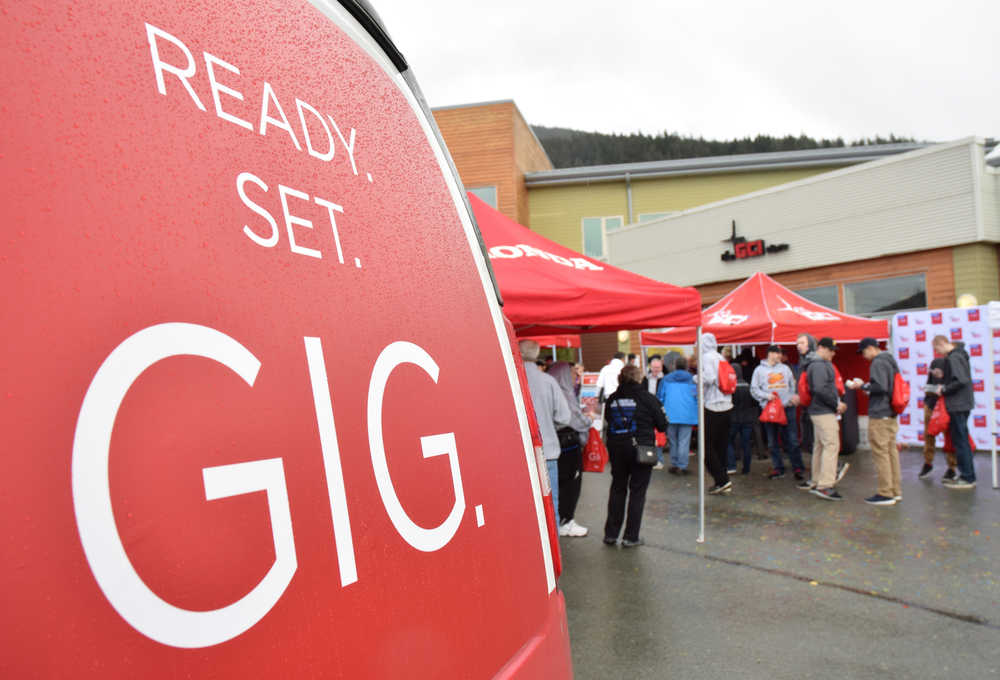Alaska has two major telecommunications companies, each with its own target market, corporate strategy and — as was on display this week — belief in the future of Alaska’s economy.
This week, GCI and ACS announced their second-quarter financial results, but what was more notable was their CEOs’ attitudes about the stability of Alaskan business in the wake of the Alaska Legislature’s failure to completely erase a multibillion-dollar budget deficit.
“The governor and the Legislature have basically given up” on balancing the state’s budget in the near term, GCI CEO Ron Duncan told investors and analysts in a remarkably pessimistic phone call on Wednesday.
The following day, ACS CEO Anand Vadapalli showed a notably upbeat attitude toward the future. “We expect an acceleration of growth,” he said of his company’s forecast.
The companies’ different views are a microcosm of the way Alaskans themselves are divided about what the state’s unresolved deficit means for Alaska. At current rates of spending, according to Gov. Bill Walker, Alaska will run out of savings to balance the budget by 2020. Even before that deadline, Alaskans will see economic impacts — the loss of the Alaska Permanent Fund Dividend being only the most obvious example. If nothing is done by 2020, the state will confront a choice between bankruptcy or enormous tax increases to balance the books.
Lawmakers and the governor are expected to take action before that 2020 deadline, but the effect of spending cuts and possible tax increases is unknown: Will it trigger a 1980s-style Great Alaska Recession, or has the state diversified enough to shrug off a reduction in government spending?
“We’re expecting the size of the market to compress rather than continue growing,” Duncan said. “We’re going to see some loss of population over the next several years up here.”
For GCI, that would have a significant impact. GCI makes a large proportion of its money from individual consumers, people who buy cellphone plans and home Internet. Fewer Alaskans means less business for GCI. While AT&T has the most Alaska cellphone customers of any single provider, according to published figures, GCI is No. 2 and is No. 1 by far in home internet.
Duncan was the founder of of Alaska’s Future, a coalition intended to pressure the Legislature into action to balance the budget. That didn’t work, and Duncan has now laid out a dim forecast.
GCI is now cutting back its plans for new construction in 2017. Instead of spending $210 million on infrastructure, it now expects to spend between $158 million and $168 million.
Duncan said he expects any effects of the Legislature’s actions (or lack thereof) to show up in the fall, but GCI is already seeing a rise in prepaid cellphone customers and a drop in postpaid customers, people who pay bills as a result of a defined contract. Prepaid cellphones are more popular among poorer Americans and those whose financial situation is unstable.
Over the past year, GCI’s share price has declined from $19.06 per share to $13.70 per share.
“We are seeing the state economy having an effect,” said GCI’s chief financial officer, Peter Pounds.
Look through the lens of ACS, GCI’s principal Alaska-based competitor, and the view is different.
ACS focuses on service to businesses, not individuals, and those sales grew 8.6 percent when compared to the same period last year. CEO Vadapalli said he expects to improve in the second half of the year.
Because ACS doesn’t have “the same exposure to the consumer business that our competition does, there’s a difference in how we are positioned in the marketplace,” he said.
ACS’ share price was $1.70 per share on Thursday, down from $2.12 per share a year ago.
Vadapalli said that “without doubt, there are some tough choices ahead for the state,” but Alaska isn’t in the same place it was in the 1980s, when plunging oil prices caused a recession, a series of bank failures, and a collapse in housing prices.
The state’s economy is more diverse, and there are more businesses in the state that are divorced from oil and government. That doesn’t mean those businesses won’t see some effects from a drawdown in oil and government, however. “From our perspective, businesses are really thinking hard and thinking out of the box” to mitigate those effects, he said.
Thinking outside the box might include better integration into the Internet economy, online marketing or other things that ACS makes possible.
“Frankly, as I like to say, when oil is $100 a barrel, there is no incentive for people to think differently,” he said.
He referred to an Anchorage Economic Development Council report that called the state’s current economic situation a “pinch,” not a “punch.”
“I believe that Alaskans and Alaska businesses are more resilient than people give us credit for,” Vadapalli said. “I have that confidence in us.”
• Contact Empire reporter James Brooks at james.k.brooks@juneauempire.com or 523-2258.

